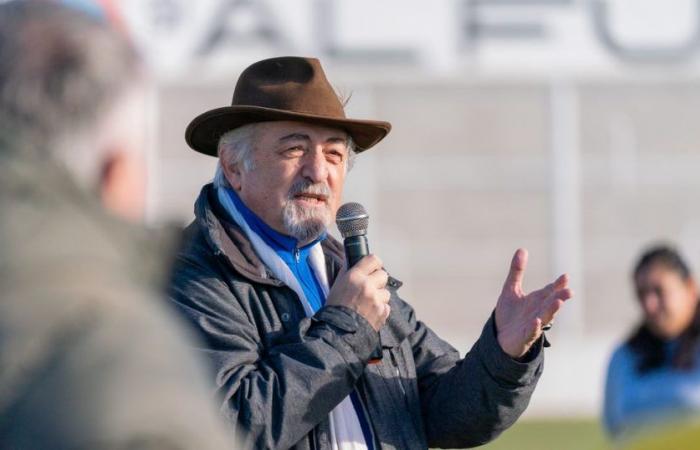Next September 29th Justicialist Party of Chubut will renew its authorities in the midst of a deep internal crisis plagued by bill passes and a judicial threat that places it on the verge of losing its legal status. He peronism is chaired by Carlos Linares Since 2020, his mandate remains extended and the senator has already anticipated that he will not seek to repeat another mandate. Meanwhile, some new faces emerge to leave behind the fathers of the last electoral defeats and the name of the mayor of Comodoro Rivadavia, Othar Macharashvilipikes in point for the internal contest.
The political and institutional situation of the provincial PJ has dragged on for years of controversy and constitutes a bomb that no one dares to defuse. In 2016, one of Linares’ main collaborators, Ricardo Mutiowas anointed as head of the PJ Executive Board in an election that was not without controversy: Mutio took office without elections thanks to a ruling by the National Electoral Chamber that prevented the list of the then mayor of Trelew from participating in the elections. Adrian Maderna. Consequently, Mutio replaced Carlos Elicechewhose mandate as head of the PJ was also extended.
Since then, Peronism in Chubut began to go through a series of electoral defeats that reached their highest point in 2021, when Linares was a candidate for senator for the Frente de Todos and obtained a meager 28.1% against Together for Change , whose formula was headed by the current governor of Chubut, Ignacio Torreswhich won 47.9% of the votes.
The defeat of the PJ had its corollary in 2023, when Together for Change obtained two crucial victories that ended up burying two decades of Peronism in Chubut: the radical Gerardo Merino He won in the city of Trelew, the echo chamber of provincial politics, and in the province Nacho Torres triumphed.
A group of Justicialist mayors, the Renovador Front and municipal parties confirmed their support for the space headed by the 36-year-old president.
At the same time, there were those who looked towards Torres, such as the communal chief of the town Sarmiento, Sebastian Balochi, who in a radio interview wondered “what would be the problem” of building politically alongside the governor. In less than 24 hours, the PJ local councils of Comodoro Rivadavia and Trelew issued two harsh statements in which they questioned whether Balochi “was really a Peronist,” even questioning his affiliation to the party.
New faces and a “favorite” in Peronism
With the PJ out of provincial power and in the midst of the new political scenario that Torres’ victory drew, other players of Chubut Peronism began to gain notoriety. Among them is Miguel “Coné” Díaz, a sub-50 leader who has known how to garner support and who was at the forefront of a dialogue line with the PRO governor, projecting a PJ who, regardless of ideologies, would work together with the president. The latter earned Díaz requests for sanctions and expulsion during the last party congress held in April in Comodoro Rivadavia.
cf5172f4-e44c-4940-90ec-027c74068a3b.jpg
Weeks later, other figures from the varied Justicialist range entered the scene. The provincial deputy of Unión por la Patria Gustavo Fita, who chairs the CGT Saúl Ubaldini of the oil city, said that “he would not mind presiding” over the space. At the same time, Othar Macharashvilithe mayor of Comodoro and successor of Juan Pablo Luque, the last candidate for governor of Peronism, is emerging as the favorite to preside over the party. At the head of the most populated city in the province, Macharashvili maintains a fluid dialogue with Torres, while he fights against YPF due to the environmental impact of the oil company’s departure from the municipal ejido.
The ejudicial crossroads
As if the internal were not enough, recently the electoral secretary of the Rawson Federal Court, Enrique Kaltenmeier, recognized that the extension of mandates in the PJ, added to a series of administrative decisions taken “without the necessary majorities”, left the party on the verge of expiration and loss of personality, unless the elections on the 29th of September are clear, pristine and free from all suspicion and questioning. The PJ, then, will have to smooth things over internally without the splinters splashing outwards and continuing to erode the credibility of its leadership, also settled by the crisis of Peronism at the national level.
The successive electoral defeats and internal struggles for party representation put the PJ at a crossroads: with its main candidate maintaining “good friends” with a provincial administration whose political space does not stop absorbing Justicialist mayors, the space that Linares presides over today is prepares to renew itself, leaving a group of figures dissatisfied with the direction that the “small table” has taken in recent years. The latter is one of the main internal reproaches of the Justicialista Party: the decision-making by the “historical” leaders of the space, to the detriment of the electoral results and a Peronist seal that has been losing color with the passage of time. , but from which no one wants to take their feet off the plate.
#Argentina


